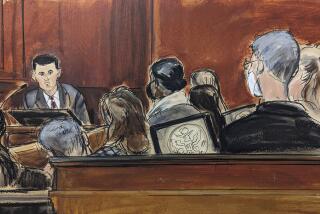Andersen Deliberations Continue
- Share via
HOUSTON — Jurors in Arthur Andersen’s obstruction-of-justice trial asked Friday for a rerun of testimony by the firm’s disgraced former Enron Corp. auditor, but they failed to reach a verdict in their second full day of deliberations.
The jury, which is being sequestered at a hotel, is scheduled to resume deliberations today.
The panel spent about an hour in the jury box listening to a court reporter read back portions of the testimony of former Andersen partner David B. Duncan, in which the 43-year-old accountant answered questions about his decision to plead guilty to an obstruction charge.
The reporter also read back testimony from FBI agent Raju Bhatia, who testified that another partner in Andersen’s Houston office, Michael Odom, deleted an unusually large number of Enron-related e-mails in early October, two days before he made a presentation to office personnel in which he urged compliance with the firm’s document-retention policy.
Prosecutors say Andersen executives in October suddenly began directing workers to comply with the policy, which calls for the disposal of drafts and other papers unnecessary for the final audit files, as a means of protecting the firm from regulators and investor lawsuits that would arise from the meltdown of Enron.
After a debate between prosecutors and defense lawyers about which portions of Duncan’s response should be repeated, U.S. District Judge Melinda Harmon agreed to allow about 40 pages of the transcript to be read back to the panel. As the court reporter read aloud, two jurors took notes. The jury foreman, who is a college professor, swiveled in his seat to hear better and appeared to be paying rapt attention.
Much of the material focused on whether Duncan was pressured by federal investigators to cut a plea-bargain deal. Andersen lead attorney Rusty Hardin had told the jury that Duncan lacked criminal intent and only agreed to plead guilty to avoid a lengthy prison sentence.
During Duncan’s cross-examination, the accountant said he initially believed he hadn’t broken the law, but he decided to plead guilty after a period of “soul-searching.” Duncan said his attorneys had told him of the possible additional sentence he could face if prosecutors charged him with other crimes, such as fraud. But under questioning from Assistant U.S. Atty. Andrew Weissmann, Duncan denied he had been coerced by federal investigators.
Outside of court Friday, Hardin declined to speculate about the panel’s discussions but said he was “delighted” because the 12 jurors are “the first people that have looked at this case [and] not rushed to judgment.”
More to Read
Inside the business of entertainment
The Wide Shot brings you news, analysis and insights on everything from streaming wars to production — and what it all means for the future.
You may occasionally receive promotional content from the Los Angeles Times.










